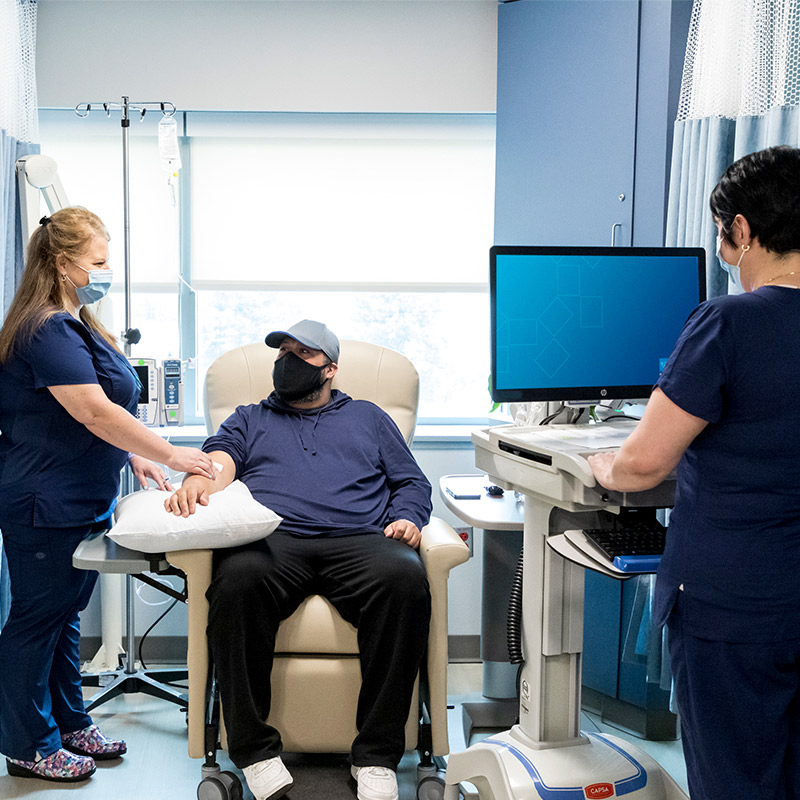Lifestyle Tips to Thrive with Multiple Sclerosis

January 15, 2025
Nearly 1 million people in the U.S. are living with multiple sclerosis (MS). The disease usually starts between ages 20 and 40 and lasts the rest of a person’s life. Often, symptoms get worse with time. But people with MS can thrive with treatment. Anuradha Singh, D.O., a neurologist at the Center for Multiple Sclerosis & Related Disorders at JFK University Medical Center, explains how.
Treating the Body and Mind
In people with MS, the immune system attacks a part of the body’s nerves. This causes a range of symptoms, such as:
- Tiredness
- Weakness
- Muscle spasms or stiffness
- Vision changes
- Difficulty thinking
- Bladder and bowel problems
- Depression
- Numbness
Disease-modifying therapies (DMTs) are a type of medicine used to reduce symptom flare-ups, called relapses. But Dr. Singh says managing MS with your lifestyle is just as important. “You can’t have one without the other. They’re both really critical to feeling well,” she says.
Lifestyle factors that can impact MS symptoms include:
- Diet
- Exercise
- Sleep
- Stress management
- Social relationships
Healthy Habits to Manage MS
Everyday choices can support your mental and physical well-being. Dr. Singh suggests:
- Regular exercise: Activities like yoga, Pilates, cycling or swimming are good for MS symptoms. “Exercise can help boost your energy and strengthen your muscles, so you don’t lose muscle mass,” she says. “Some patients like going to physical therapy to get hands-on help.”
- Healthy eating: Too much salt can make MS inflammation worse, Dr. Singh says. So steer clear of salty foods and aim for a heart-healthy diet with plenty of fruits, vegetables, whole grains, lean meat, poultry, fish and nuts.
- Vitamin D: This vitamin is essential for a healthy immune system, so Dr. Singh suggests people with MS take a vitamin D supplement. Ask your doctor what dose is right for you.
- Don’t smoke: Smoking isn’t healthy for anyone, and it can make MS worse.
Mental Health Boosters
Learning you have MS and dealing with the symptoms can understandably make you anxious or depressed. But mood problems can actually make MS symptoms seem worse, even if MRI imaging tests don’t back that up, Dr. Singh says. “If you’re living with a high level of anxiety or stress, sometimes that can make you feel your MS is getting worse,” she says. “You may feel your symptoms flaring up.”
That’s why it’s key to manage the emotional impact of MS. Seeking support from partners, loved ones or others living with MS can help, Dr. Singh says. When you can share the physical and mental load of the disease, you’ll have a brighter outlook.
“Patients who live in senior homes like to join social events, such as card games or movie nights, while younger patients often go to MS support groups,” she says. “Just branching out and trying to stay active is really vital.”
On top of healthy lifestyle strategies, Dr. Singh offers these tips to help cope with the mental health challenges of MS:
- Get enough rest: Aim for seven to eight hours of sleep each night.
- Seek support: The National Multiple Sclerosis Society offers support groups and connection programs nationwide for MS patients and their caregivers. “It can be so helpful just to talk with someone going through something similar to you,” Dr. Singh says.
Next Steps & Resources:
- Meet our source: Anuradha Singh, D.O.
- Make an appointment with a neurologist or call 800-822-8905.
- Learn more about neurosciences at Hackensack Meridian Health.
The material provided through HealthU is intended to be used as general information only and should not replace the advice of your physician. Always consult your physician for individual care.






